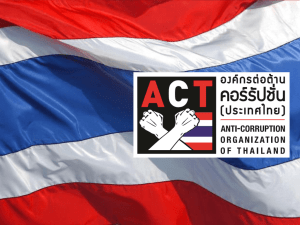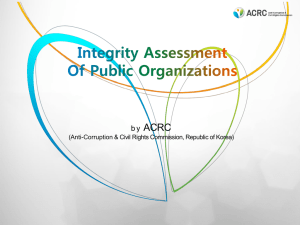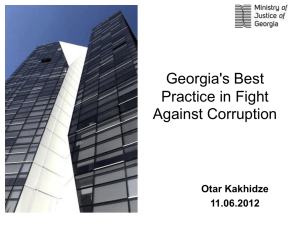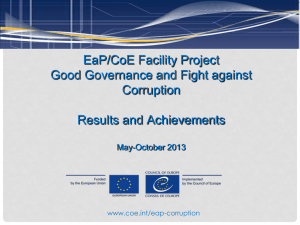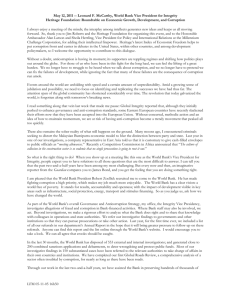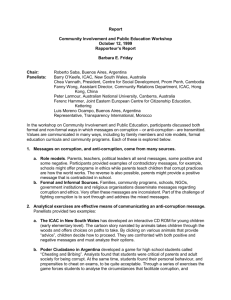Programme - Governance Assessment Portal
advertisement
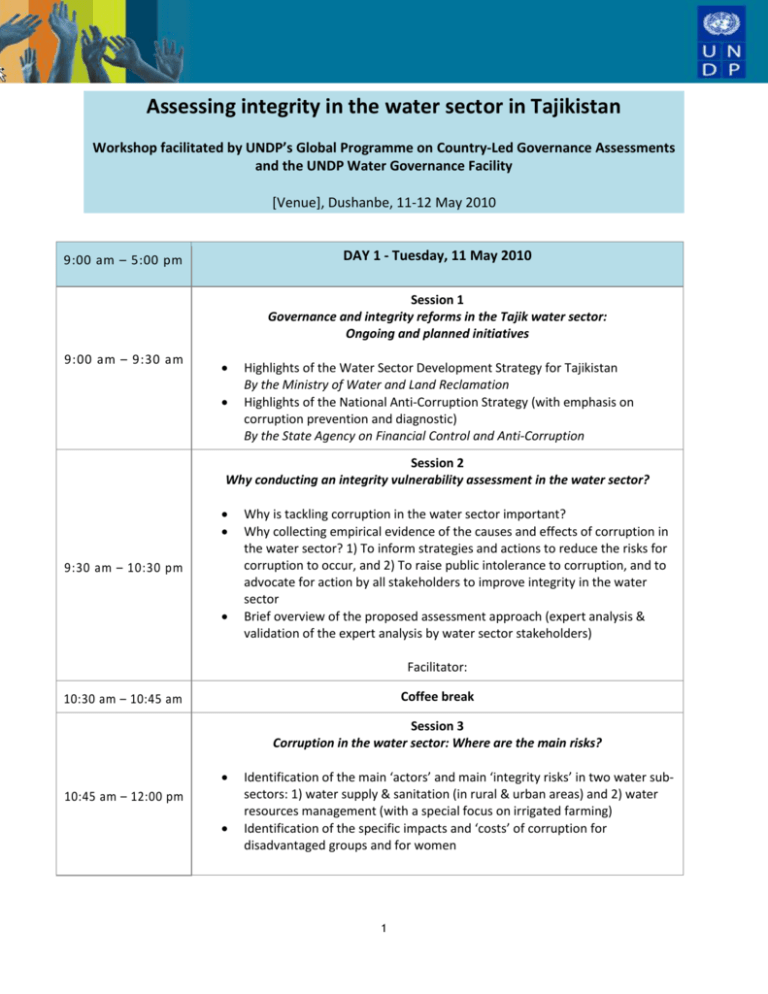
Assessing integrity in the water sector in Tajikistan Workshop facilitated by UNDP’s Global Programme on Country-Led Governance Assessments and the UNDP Water Governance Facility [Venue], Dushanbe, 11-12 May 2010 DAY 1 - Tuesday, 11 May 2010 9:00 am – 5:00 pm Session 1 Governance and integrity reforms in the Tajik water sector: Ongoing and planned initiatives 9:00 am – 9:30 am Highlights of the Water Sector Development Strategy for Tajikistan By the Ministry of Water and Land Reclamation Highlights of the National Anti-Corruption Strategy (with emphasis on corruption prevention and diagnostic) By the State Agency on Financial Control and Anti-Corruption Session 2 Why conducting an integrity vulnerability assessment in the water sector? 9:30 am – 10:30 pm Why is tackling corruption in the water sector important? Why collecting empirical evidence of the causes and effects of corruption in the water sector? 1) To inform strategies and actions to reduce the risks for corruption to occur, and 2) To raise public intolerance to corruption, and to advocate for action by all stakeholders to improve integrity in the water sector Brief overview of the proposed assessment approach (expert analysis & validation of the expert analysis by water sector stakeholders) Facilitator: Coffee break 10:30 am – 10:45 am Session 3 Corruption in the water sector: Where are the main risks? 10:45 am – 12:00 pm Identification of the main ‘actors’ and main ‘integrity risks’ in two water subsectors: 1) water supply & sanitation (in rural & urban areas) and 2) water resources management (with a special focus on irrigated farming) Identification of the specific impacts and ‘costs’ of corruption for disadvantaged groups and for women 1 Lunch 12:00 pm – 01:00 pm Session 4 Internal ‘expert’ assessment methodologies for identifying corruption risks: Looking at the legal framework, internal procedures & incentives 01:00 pm – 3:00 pm ‘Vulnerability assessments’ in the WSS & WRM sub-sectors Country examples: o A ‘risk mapping study’ on integrity and accountability in the Ugandan WSS sector (based on desk review & interviews with key water stakeholders) o Mapping risks areas for potential corruption in water licensing in Kazakhstan (based on interviews & field observations) Planning ahead: How to adapt this approach to the Tajik context? What should be the scope of the assessments: should we include an analysis of the country’s integrity institutions (anti-corruption commission, ombudsman, parliament, etc.) or water institutions only? 03:00 pm – 03:30 pm Coffee break Session 5 External assessment methodologies for identifying corruption risks: Participatory methodologies with water stakeholders 03:30 pm – 5:00 pm Corruption surveys (for consumers & providers): Presentation of the ‘baseline survey’ on integrity in the Ugandan water sector Participatory Corruption Appraisal: Presentation of the Indonesian experience 2 DAY 2 - Wednesday, 12 May 2010 9 : 00 a m – 3 : 00 pm 9:00 am – 10:30 am Session 6 Planning ahead: What external assessment methodologies are most suitable to the Tajik context? How to combine different assessment tools for a comprehensive assessment? Pros and cons of various methods: scientific rigor, inclusiveness, interactivity, costs, etc. Thematic scope: narrow focus on corruption vs. general satisfaction with water services Key issues to focus on Respondent groups to include: urban/rural service providers, urban/rural customers, private contractors/suppliers, utility employees, local government staff, etc. Sampling framework Geographical scope Partnerships 10:30 am – 10:45 am Coffee break Session 7 Development of a Water Sector Integrity Vulnerability Mitigation Plan 10:45 am – 12:00 am Design of a prioritized anti-corruption plan for the water sector o Experience from Uganda in convening a Water Integrity Workshop to validate the findings and secure a commitment to action from the concerned institutions o Sharing examples of mitigation plans in the WSS and WRM subsectors Planning ahead o Who should be involved in developing the plan? o How to prioritize which recommendations to take forward (given limited human & financial resources)? o How to hold institutions accountable on their commitments? o How to monitor the implementation of the plan? Who should be involved? Sharing international experiences 12:00 pm – 01:00 pm Lunch 3 Session 8 Communication strategy 1:00 pm – 2:00 pm How to design a communication strategy that supports the assessment objectives: o Distinguishing between a communication strategy for raising public awareness, and a communication strategy for promoting integrity reforms within institutions o Crafting different communication strategies for different types of findings, and for different audiences Session 9 Planning the next steps: Workplan 2: 00 pm – 3: 00 p m Timeframe, division of labor, expertise needed, budgeting, etc. 4






